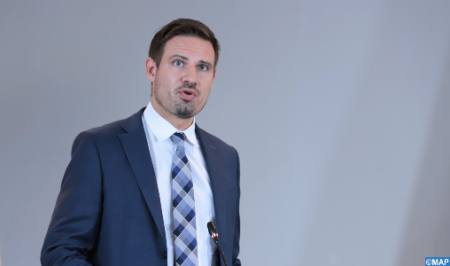PACE Observers Commend ‘Integrity, Transparency’ that Marked Sep. 8 Legislative Elections
Observers of the Parliamentary Assembly of the Council of Europe (PACE) on Thursday in Rabat deemed as “a success” the legislative elections held Wednesday, which were marked by “integrity” and “transparency” across the entire national territory, simultaneously with municipal and regional elections. Mandated to observe the legislative elections, the delegation, led by the Italian MP Alberto Ribolla, congratulated the Moroccan people for these “peaceful” elections under the leadership of HM King Mohammed VI, welcoming the “professionalism” of the authorities that organized these elections. The delegation also welcomed the increase in the voter turnout which reached more than 50%, i.e. seven points more compared to the legislative elections of 2016, noting that this figure, which only concerns voters registered on electoral lists, does not reflect the electoral potential as a whole. The holding of these elections, within the time limits set in the middle of the third wave of the COVID-19 pandemic, shows Morocco’s commitment to maintain its openness and its attachement to the highest standards of democracy and the rule of law, said the delegation, stressing that the efforts made by the State to foster a broader, more inclusive and more representative participation “deserve to be recognized”. The delegation, split into seven teams, visited several polling centers in the cities of Rabat, Casablanca, Fez and Marrakech where it observed the conduct of the electoral operation. Speaking at a press conference dedicated to the presentation of the results of the observation mission, Ribolla described these elections as a “successe”, despite some challenges, linked on the one hand to the organization of a triple election on the same day and the modification of the electoral system, and on the other hand the Covid-19 pandemic which carried many risks, in particular abstention. “The voting in the polling stations that we observed was on the whole very well organized, the members of the offices were in the majority very cooperative with our observers and the voting process was transparent,” he pointed out, praising the Moroccan authorities, and in particular the National Human Rights Council, for “their spirit of cooperation”. He noted, however, a few cases of non-compliance with voting procedures, “these not being deliberate”, regretting the lack of accessibility for people with special needs to some polling stations, which, according to him, is “observed also in all European countries”. The MP welcomed “with great satisfaction” the efforts made by Morocco to improve the participation of women in political life, commending the introduction of the new regional list, which paves the way for an increased representativeness of women in the parliament. On the other hand, he regretted the late adoption of the amendments to the electoral law, “only a few months before the launch of the official campaign”, calling on the new parliament to make improvements in this regard. In this context, he underlined the need for a new delimitation of local constituencies which would better reflect the changes in the demographic distribution in the country, as well as the development of an appropriate legal framework to improve transparency of campaign funding. The head of the PACE delegation expressed the hope that Moroccans living abroad will enjoy their constitutional right to vote, noting that the Moroccan community abroad may have a positive impact on the voter turnout. PACE is observing the legislative elections for the third time at the invitation of the Kingdom. The delegation is made up of 11 PACE members, representing the five political groups in the Parliamentary Assembly and coming from 10 different European member states, as well as a legal expert from the Venice Commission. The Moroccan Parliament has enjoyed the Partner for Democracy status with PACE since 2011.

